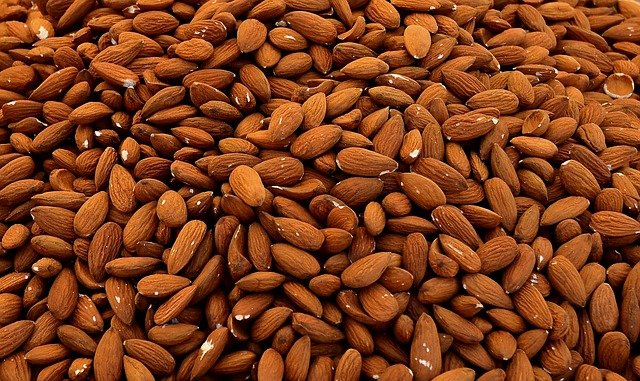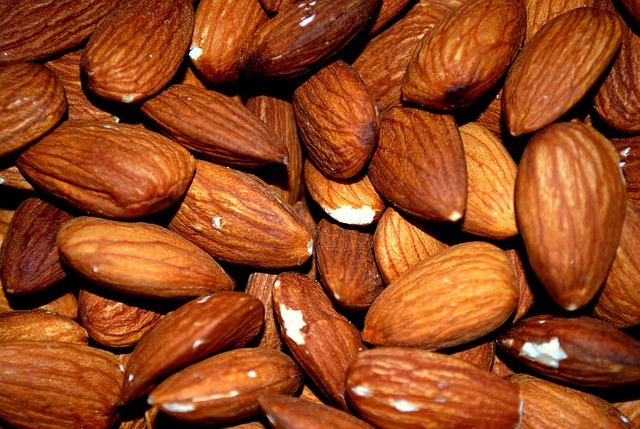Almonds are healthy for humans to eat and are often used as a way to include healthy fats in your diet. If you own a cockatiel I’m sure you’ve wondered can a cockatiel eat almond nuts?
The simple answer is yes, cockatiels can eat almonds and they add a wide variety of extra nutrients and beneficial vitamins and minerals to your cockatiel’s diet.
The almond should be removed from the hard shell but you can leave the brown skin on if your cockatiel will eat them with it on. Almonds can be bought flaked and whole.

Are Almonds Healthy for Cockatiels?
Almonds are highly nutritious and will add lots of extra vitamins and minerals to your cockatiel’s diet. They are high in fibre, protein, fat and carbohydrates.
Due to their high content of additional nutrients, vitamins and minerals you should limit your bird to a maximum of 1-2 grams per day or more realistically, as an occasional treat once a week.
Nutritional Content of Almonds
| Typical Values | Per 10g |
| Total Fat | 4.99g |
| of which saturated | 0.38g |
| Carbohydrate | 0.91g |
| of which sugars | 0.42g |
| Fibre | 1.25g |
| Protein | 2.12g |
| Salt | 0.002g |
| Vitamins and Minerals | |
| Vitamin E | |
| Manganese | |
| Magnesium | |
| Copper | |
| Vitamin B2 (Riboflavin) | |
| Phosphorous |
Fat
As with any type of fat, too much and your cockatiel will gain weight. As nuts are traditionally high in both healthy and not so healthy fats, you should feed them only as an occasional treat.
Fibre
Fibre is an important part of a cockatiel’s diet, however, most foods already included in your cockatiel’s diet will contain quite a high amount of fibre.
Protein
Protein is required for the normal growth of muscle, skin, organs and bone. It is essential to help wound healing, blood formation, immune system support and hormone production.
It can help with tissue repair of injured birds, help provide energy to support your bird’s activity and also promote feather growth.
Excess protein consumption is bad for birds too and can have a negative impact on their growth, organs and bowels.
Vitamin E
Vit E is a fat-soluble vitamin and is important for its interaction with several other important nutrients in the body. Vitamin E helps to maintain the health of the cells of the bird’s body.
It is important to bird’s too as it helps with immune support and can reduce the impact of stress on the health of your bird.
Magnesium
Magnesium has lots of benefits and effects for your bird but a balanced diet should be observed and magnesium should not be overly included.
Magnesium can help your cockatiel cope with mood and stress especially during malting or other stressful times. It will also help to lower blood pressure and improve energy levels.
Copper
Copper can help maintain healthy bones and provide strong skeletal support for your bird. Your bird must not be fed copper-rich foods excessively apart from the occasional treat.
Copper also helps with immune support and iron absorption.
Vitamin B2
Lack of Vitamin B2 (Riboflavin) can lead to deformity in birds and curled toe paralysis in baby birds. You should maintain healthy levels of Vit B2 in your bird’s diet.
Phosphorous
Phosphorous is used in bones and in the storage of energy. Phosphorous is present in seeds and therefore not be overfed as Phosphorous will limit calcium absorption.
Can Cockatiels Eat Peanuts? Find out HERE
How to Feed Almonds to a Cockatiel?
Almonds weigh approximately 1 gram each once the hard outer shell is removed. Personally, if you insist on feeding almonds to your cockatiel regularly then 1 gram or 1 nut is plenty.
I always recommend buying almonds from a health store or supermarket to ensure you have human grade almonds because pet stores often have cheaper but lower quality nuts.

If your almonds are bought with the hard shell still intact then you will need to crack the nut to reveal the nutritious nut inside. Check for signs of freshness and do not clean it.
Personally, I recommend crushing the almond into small pieces that are easily manageable as ‘bitesize pieces. This will also make it more appealing for your bird.
The brown outer skin can be left on or removed depending on your bird’s willingness to attempt to eat it for the first time. If you remove the brown skin you’ll reveal the white nut underneath.
There are lots of types of almonds that can be bought from the store but you will need to buy almonds that do not have salt added and ideally roasted are best but must be salt-free.
Also, do not give your bird almonds that may have been sprinkled with sugar or have been polished with some kind of glaze to make them more appealing. You need ‘raw almonds’.